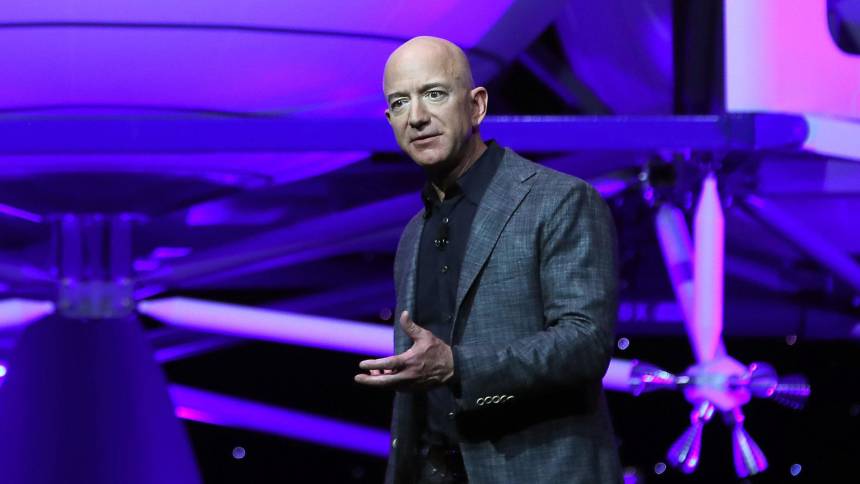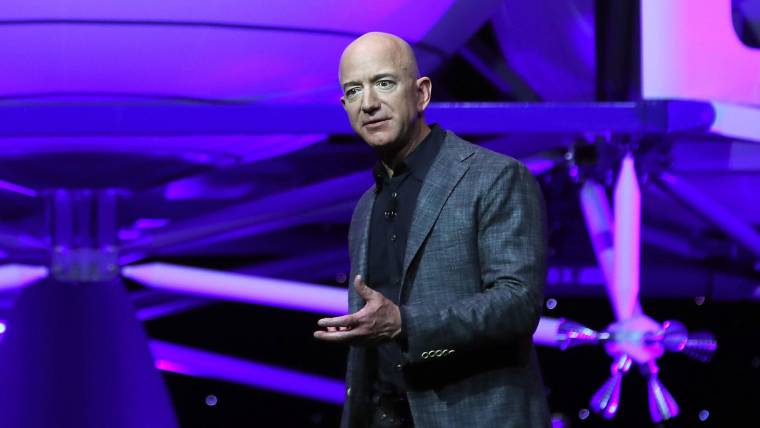16.05.2019
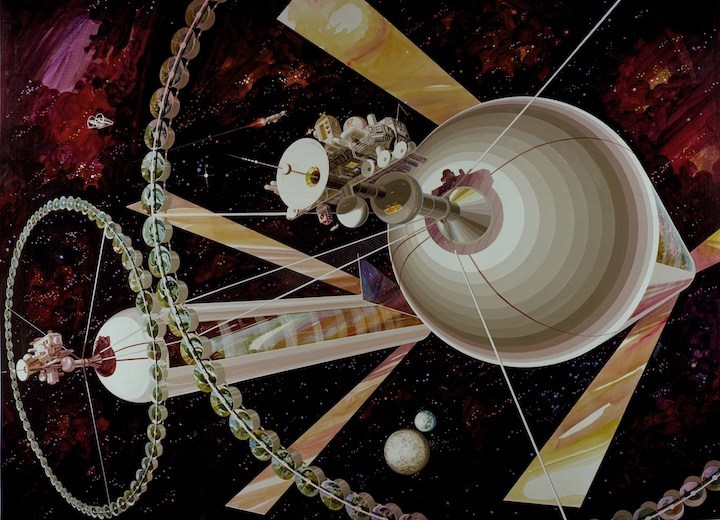
At a slick media event in Washington last Thursday, billionaire Jeff Bezos announced that his rocket company, Blue Origin, is developing a moon lander that could deliver cargo and astronauts to the lunar surface by 2024.
But going to the moon is just the beginning of his vision. What he really wants to do, Bezos declared, is find a new home in space for our species.
For near-term problems like poverty and pollution, he said, we need to find solutions close to home. “But there are also long-range problems, and we need to work on those, too," he said. "They take a long time to solve. You can’t wait until the long-range problems are urgent to work on them.”
In particular, Bezos worries that technological progress depends on an ever-growing supply of energy. Within a couple of centuries, he said, we’ll have outstripped any reasonable source of energy on Earth.
His solution? Move off the planet and into space colonies — enormous ones, and lots of them.
“These are very large structures, miles on end, and they hold a million people or more each,” he explained. He envisions millions of such colonies housing trillions of people, sustained by continuous sunshine and the vast resources available on the moon, asteroids and other parts of the solar system.
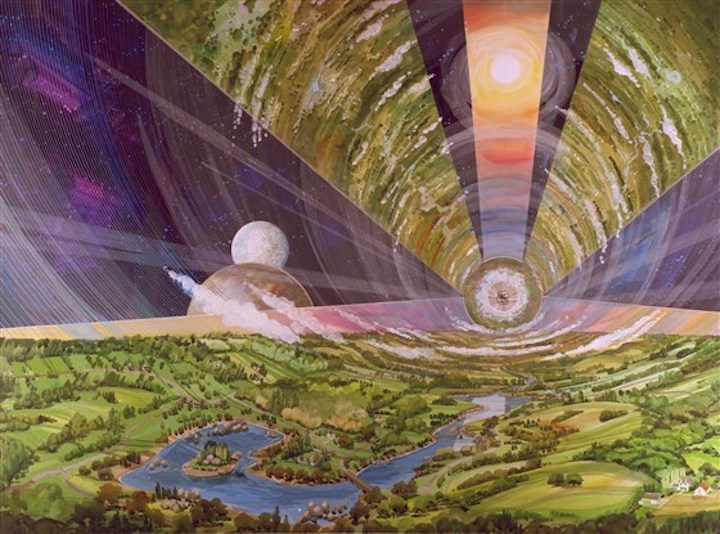
The cylinders would include alternating stripes of land and window.Rick Guidice / NASA
Instant public response to Bezos's presentation included lots of sharp commentary that the CEO of Amazon could easily be describing office parks or captive-labor towns in space. Others objected that Bezos overstated the world’s growing need for energy, while ignoring his own company’s contributions to climate changeand unsustainability.
But many people within the space-enthusiast community were thrilled. Al Globus, a former NASA contractor and co-director of the National Space Society, had a one-word reaction: “Fantastic.”
Gerard O’Neill’s frontier vision
Bezos’s ideas draw directly from the vision of Gerard K. O’Neill, a Princeton University physicist who attracted attention in the 1970s for his detailed concepts for human settlements in space. Bezos was a student at Princeton while O’Neill was there and has cited O’Neill’s signature book, "The High Frontier," as a major influence.
Like Bezos, O’Neill worried about the limits of growth on Earth, though he focused on overcrowding rather than limited energy. “As population continues to expand, we’ll have to abandon the development of greater individual freedom and accept a much more regulated life with diminished options,” O’Neill said in a 1979 interview with OMNI magazine.
Space colonies would allow a far more inviting future, he claimed: “There would be fewer people living on Earth and an increasing fraction living in space, where there’s unimaginable room. Those in space colonies would also find the situation much more open and free.”
O’Neill’s proposed colonies would be mile-wide spheres or cylinders, spinning to create artificial gravity on the inside. They would be constructed from material mined from the moon and delivered into space using enormous electromagnetic catapults. Mirrors would pipe in sunshine, and solar panels would provide continuous electricity. As the population expands, people would simply build new cylinders to accommodate their needs.
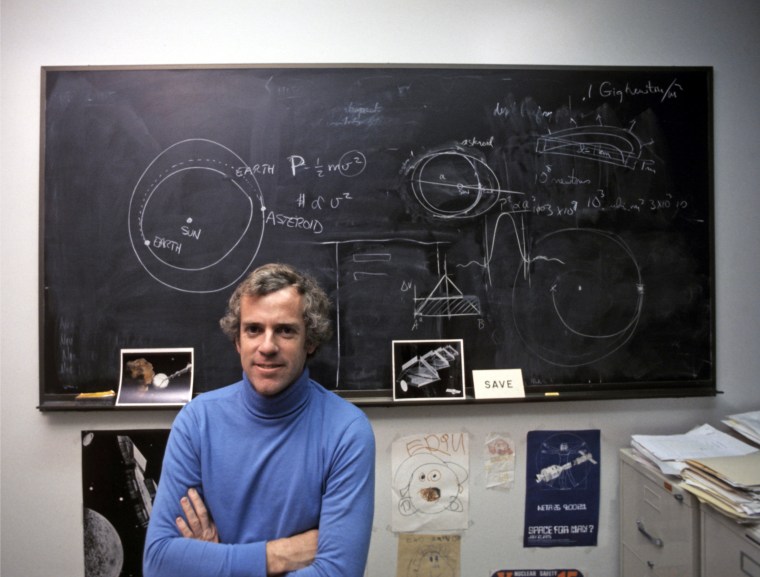
In endorsing O’Neill’s approach, Bezos has set himself starkly apart from SpaceX founder Elon Musk, his rival space-obsessed billionaire entrepreneur. Musk has argued that humans need large outposts on Mars in case Earth is destroyed by an asteroid or is rendered uninhabitable by some terrestrial cataclysm.
Bezos scoffs at that kind of thinking. “We want to go to space to save the Earth,” he said in 2016. “I don’t like the ‘Plan B’ idea that we want to go into space so we have a backup planet.”
How to get from six to a trillion
Bezos describes an idyllic life aboard his future space colonies, each of which could have its own theme and function. Some might resemble historic cities. Some might be space farms or interplanetary wilderness areas. “And you could have a recreational one that keeps zero G so you can go flying with your own wings,” he said. Space taxis could carry visitors from colony to colony in a day or less. Meanwhile, heavy industry would be moved off-Earth “to preserve this unique gem of a planet.”
What Bezos didn’t discuss at the Washington event was how, exactly, to make this glorious future happen. In 1973, when O’Neill was writing his first paper about space colonization, there were three people living in orbit. A half century later, that number has risen to just six. Broadly speaking, Bezos is betting that private industry can greatly accelerate the process by driving down the cost of space access — a key goal of Blue Origin.
Globus agrees, and has co-authored a whole book ("The High Frontier: An Easier Way") that fills in the details. He sees the process beginning with private space stations, similar in scale to today’s International Space Station, some of which could be space hotels. Those would be followed by ever-larger settlements in low orbit around the Earth, then located farther out.
“This will provide a market for lunar and asteroid materials, and a space mining industry will develop,” Globus says. “Settlements will get bigger and better, and move farther and farther out, until O’Neill’s vision is eventually fulfilled.”
Making that scenario a reality will require a lot of society-wide changes, says Phil Metzger, a University of Central Florida planetary physicist who works on technology for space mining. “People imagine trying to build these great worlds within the framework of the current economic and political regime, and that doesn’t make sense,” he says. “But once we establish autonomous robotic industry in space to benefit the Earth, it will cost us nothing to scale it up to giant proportions. It will be a revolution in the very nature of civilization.”
Who owns the future?
Rachel Armstrong, a professor of experimental architecture at Newcastle University in England, cautions that the infrastructure challenges are only part of the story. “We haven’t even perfected making life-supporting architectures on our own life-bearing planet,” she said in an email. To keep large numbers of people alive in huge, sealed containers in space, “we will need to think about establishing communities of living things.”
Armstrong takes exception, too, with the word “colonization,” which Bezos and others in the close-knit community of O’Neill disciples throw around routinely. The term is problematic not just because it echoes past actions that resulted in the deaths of countless people, she maintains. It also evokes a top-down approach that could be disastrous for space habitats that will depend intensely on social and biological cooperation.
Armstrong said that words like symbiosis (living together) and sympoiesis (making together) would be "a much better start for the establishment of terrestrial life beyond this world." She also advocates for a future space culture that values biological harmony over “consumerist individualism.”
Those sentiments may not sit well with Bezos, whose presentation was heavily predicated on the idea that more is better. (“If we’re out in the solar system, we can have a trillion humans in the solar system, which means we would have 1,000 Mozarts and 1,000 Einsteins,” he said.) But even the world’s richest man, with a net worth of $155 billion, is aware that this particular dream is astronomically bigger than he is.
His ambition with Blue Origin is not to change the way we live today, or necessarily even in his lifetime. He is looking centuries into the future, with the goal of pointing the way he thinks society should go.
“We get to choose: Do we want status quo and rationing, or do we need dynamism and choice?” he asked. “This is an easy choice.”
Quelle: NBC

